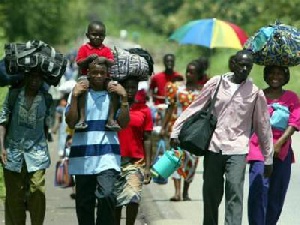A total of 2,300 Togolese refugees in the Volta region have opted to integrate into communities hosting them in Ghana.
The laws of Ghana, however, forbid them from any political activities such as elections in Ghana, Ken Dzirasah, Chairman of the Ghana Refugee Board explained.
Some of the refugees are said to have sought refuge in Ghana between 1993 and 2005 due to the political developments in Togo.
The headquarters of the United Nations High Commission for Refugees (UNHCR) would provide funds to support “the government of Ghana’s efforts to implement the local integration,” process under the “Seeds for Solutions Project,” launched in Ho.
The UNHCR Ghana Representative said these in a statement read by Ms. Doris Wiafe-Annor, Officer-in-Charge.
“For those choosing local integration…the “Togolese Government would provide them with national passports while the Ghanaian authorities provide residence permits, after vetting by the Ghana Immigration Service,” the UNHCR said.
The Project is said to be based on Ghana’s proposal, which was accepted by the UNHCR Head Office in Geneva from among 18 countries.
The main objective of the two-year project is “to ensure that refugees access national services, achieve self-reliance and obtain an alternative legal status… by 2015,” a Fact Sheet compiled by the UNHCR Ghana Country Office said.
Under the Project, a market assessment and value chain analysis would be conducted to determine the marketability of skills and trade areas where the refugees have a comparative advantage.
A total of 400 refugees who engage in indigenous farming will be supported with agricultural inputs and farm tools.
Micro-credit would be extended to 150 refugees who are engaged in trading, in addition to 243 refugees who are already benefitting from such facility.
Some of the refugees would also benefit from vocational and technical skills training and given start-up kits.
In the second year, a one-time cash grant would be extended to the refugees to address basic needs such as livelihood, shelter and nutrition.
Refugees, who want to, would be enrolled into the National Health Insurance Scheme.
There would also be a “one-off enrollment for 100 adolescents who have successfully completed basic schools and have obtained the required grades in the West African Examination Council’s Basic Education Certificate Examination in public schools.
Mr Dzirasah cautioned those refugees still undecided on integration that the chance would not be there for them once the international community (UNHCR) has announced the day on which the integration status has been granted to their compatriots.
He advised those who have opted to be integrated to conduct themselves well and obey the customary laws and traditions of host communities and be actively involved in development activities.
Mr Dzirasah who explained issues concerning integration to chiefs and representatives of the refugees advised the Togolese to be united in their approach to welfare issues and not lose sight of their Togolese nationality.
Mrs Helen Adjoa Ntoso, Volta Regional Minister, thanked chiefs and people in host communities for their hospitality towards the Togolese refugees over the years, the UNHCR, Ghana, and the Ghana Refugee Board and their allies for initiating the integration process.
She appealed to communities hosting the refugees to continue to do so because “communities grow and develop not only from their citizens but largely from visitors and strangers.”
Mrs Ntoso gave the assurance that “the government would continue to provide the needed peace and stability in the West Africa sub-region to serve as a safe zone for our neighbouring countries,” and called for a peaceful political atmosphere in Ghana.
Some of the refugees expressed gratitude to the government for its hospitality and to stakeholders for giving them opportunities to further their education and training.
They expressed the hope that the UNHCR, the Refugee Board and the government of Ghana would help them overcome challenges of unemployment.
General News of Sunday, 27 July 2014
Source: GNA

















